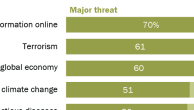
Americans’ views of global threats differ by party, age
Seven-in-ten Americans view the spread of false information online as a major threat facing the nation in 2025.
Numbers, Facts and Trends Shaping Your World
All
Publications
Seven-in-ten Americans view the spread of false information online as a major threat facing the nation in 2025.
Ahead of President Joe Biden’s third State of the Union address Americans are focused on the health of the economy and immigration.
Dealing with coronavirus has declined as a policy priority, especially among Republicans. This marks a shift from last year, when the economy and the coronavirus both topped the public’s policy agenda.
Twenty years ago, Americans came together – bonded by sadness and patriotism – after the 9/11 terrorist attacks. But a review of public opinion in the two decades since finds that unity was fleeting. It also shows how support for the wars in Afghanistan and Iraq was strong initially but fell over time.
Most say cooperation with other countries is important in dealing with global threats, especially on the spread of infectious diseases.
Around seven-in-ten Americans or more have seen defending against terrorism as a top priority for the White House and Congress since early 2002.
Today, 68% say the U.S. is less respected by other countries than it was in the past.
The Sept. 11 attacks united Americans in a way that few other historical events have.
About eight-in-ten U.S. Muslims (82%) say they are either very (66%) or somewhat concerned (16%) about extremism committed in the name of Islam around the world.
People across Europe and in the U.S. and Canada have pervasive concerns about the threat of Islamic extremism in their countries.
Notifications
